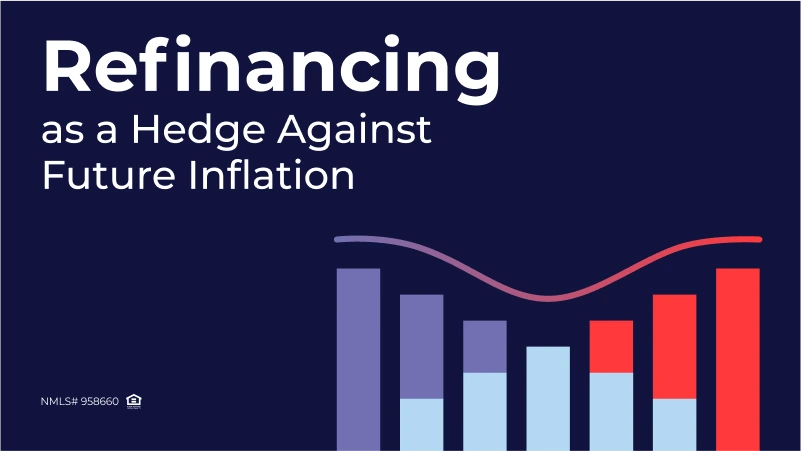
Inflation is often seen as an economic factor beyond anyone’s control. But for homeowners and real estate investors, there are strategies that can help mitigate its impact. One such strategy is refinancing. Mortgage brokers who understand the importance of hedging against inflation can offer their clients a powerful tool—refinancing into a fixed-rate mortgage. It not only stabilizes payments but also protects against future financial uncertainty. This article will help you explore refinancing benefits. Moreover, you will learn how refinancing, while interest rates remain relatively low, can serve as a safeguard for clients concerned about rising inflation.
Whether your clients are homeowners, real estate investors, or individuals simply trying to secure their financial futures, understanding the link between inflation and mortgage rates is critical to offering them the best possible advice.
The Impact of Inflation on Mortgage Payments
Inflation, in simple terms, is the rate at which the cost of goods and services increases over time. As inflation rises, the purchasing power of money decreases, meaning that everything from groceries to rent becomes more expensive. For those with mortgages, inflation can have a particularly concerning impact, especially if they have adjustable-rate mortgages (ARMs) or other variable-rate loans.

Struggling with
a loan scenario?
Get a solution in 30 minutes! Fill out
the short form and get your personal offer
When inflation rises, central banks often respond by increasing interest rates to stabilize the economy. For homeowners, this could mean higher mortgage payments as the interest rate on adjustable-rate loans adjusts upward. Even for those with fixed-rate mortgages, rising inflation might make it harder to keep up with other household expenses, leaving less disposable income for long-term financial goals.
However, for clients who refinance now, they have the opportunity to lock in today’s lower rates and hedge against future inflationary pressures, ensuring that their mortgage payments remain stable even as other costs rise.
Refinancing as a Hedge Against Inflation
Refinancing a mortgage is more than just a way to lower monthly payments or switch loan terms. For many, it can serve as a strategic hedge against inflation. By refinancing into a fixed-rate mortgage, borrowers can lock in their current interest rate and payment structure for the remaining life of their loan. This means that even if inflation drives interest rates higher in the future, the borrower’s mortgage payments will remain unaffected.
Here’s how refinancing can be used as an inflation hedge.
- Fixed Monthly Payments. In a fixed-rate mortgage, the interest rate and the principal payment remain constant, regardless of market conditions. If inflation rises, everything else might become more expensive, but your clients’ mortgage payments stay the same. This predictability helps clients plan their finances more effectively.
- Interest Rate Stability. Inflation often leads to higher interest rates. Borrowers who act now and refinance into fixed-rate mortgages can benefit from today’s rates. Those may be lower than what they’ll face in the future. By locking in a rate, clients protect themselves from the higher rates that typically follow inflationary periods.
- Cash-Out Refinancing for Investments. Some clients may want to take advantage of cash-out refinancing to access the equity in their homes. By using this equity to invest in inflation-resistant assets such as real estate or commodities, borrowers can further hedge against inflation.
Who Benefits Most from Refinancing Now?
While refinancing as a hedge against inflation is a sound strategy, it’s important to understand who stands to gain the most from taking this step. As a mortgage broker, you have the opportunity to identify clients for whom refinancing can provide significant long-term financial protection.
- Homeowners with Adjustable-Rate Mortgages (ARMs). ARMs can leave borrowers vulnerable to rising interest rates, particularly in inflationary times. Refinancing these clients into fixed-rate loans can help stabilize their housing costs.
- Real Estate Investors. For real estate investors, refinancing can be especially beneficial. Inflation often increases rental income, but it can also drive up the cost of financing future investments. Locking in a low, fixed interest rate on existing properties allows investors to protect their margins and avoid future financing challenges.
- Long-Term Homeowners. Clients who plan to stay in their homes for many years may find that refinancing provides peace of mind. Knowing that their mortgage payments won’t increase—even if inflation affects other areas of their budget—can be a powerful financial advantage.
Inflation-Proofing Property Investments
Real estate investors face unique challenges when it comes to inflation. On the one hand, inflation can increase rental income, as property values and rents typically rise in line with inflation. On the other hand, inflation can also drive up the cost of borrowing, making future property acquisitions more expensive. For these reasons, refinancing investment properties at today’s rates can be a crucial step toward inflation-proofing a real estate portfolio.
Refinancing an investment property into a fixed-rate loan ensures that the cost of financing remains stable, regardless of future inflation. This is especially valuable for investors relying on steady cash flow to maintain profitability. Additionally, some investors may choose to use cash-out refinancing to leverage their existing properties’ equity for further investment. By reinvesting this equity in other inflation-resistant assets or properties, investors can further protect their wealth from the eroding effects of inflation.
Inflation and Interest Rates: Why Timing Matters for Refinancing
A key reason refinancing now is a smart move involves the relationship between inflation and interest rates. When inflation rises, central banks like the Federal Reserve often raise interest rates to control the money supply and reduce inflationary pressures. These higher rates can make borrowing more expensive, including for mortgage loans.
For homeowners and investors, this is where the timing becomes crucial. With inflationary pressures already present in the economy, refinancing today means locking in lower rates before they potentially increase in response to further inflation. A fixed-rate mortgage essentially insulates borrowers from future rate hikes, providing certainty and stability over the long term.
Struggling with a loan scenario?
Get a solution in 30 minutes!Fill out the short form and get your personal offer
Submit a ScenarioHistorical data shows that during periods of inflation, interest rates tend to follow an upward trajectory. For example, during the late 1970s and early 1980s, inflation soared, and so did mortgage rates—climbing to double digits in some cases. While today’s market is more stable, inflation could still drive rates significantly higher than their current levels. For clients who lock in today’s rates, this risk is mitigated.
How Brokers Can Educate and Advise Clients
As a mortgage broker, your role is not only to facilitate refinancing but also to educate clients on the long-term benefits of doing so, particularly in the context of inflation. Many clients may not be aware of how inflation could impact their mortgage payments or overall financial situation. It’s essential to provide them with clear, data-driven advice on why refinancing now can protect their financial futures.
Key Points to Communicate
- Current Economic Climate. Share insights into how inflation and interest rates are moving and explain the relationship between the two. Help clients understand that acting now to refinance could save them money and stress later.
- Future-Proofing Payments. Highlight the predictability of fixed-rate payments, especially for clients who are concerned about the rising cost of living. Fixed payments allow them to plan their finances without worrying about future rate increases.
- Long-Term Stability vs. Short-Term Savings. For clients with adjustable-rate loans who might be focused on low initial payments, explain the trade-offs. While ARMs offer short-term savings, the long-term risk of rising rates could outweigh those benefits in an inflationary period.
Client Scenarios to Address:
- The Budget-Conscious Homeowner. These clients often look to refinancing for immediate savings. Position refinancing as a tool not just for lowering payments now, but for safeguarding against potential financial strain in the future due to inflation.
- The Real Estate Investor. For investors, highlight how refinancing investment properties can stabilize financing costs and secure predictable cash flow. Explain how leveraging existing equity through cash-out refinancing can also serve as an opportunity to expand their portfolio in a market that may become more challenging as inflation rises.
- The Retiree or Near-Retiree. Older clients may be particularly sensitive to rising inflation, as it can erode their fixed incomes. Refinancing could offer them the peace of mind that their mortgage payments will remain constant, providing greater financial security during retirement.
Practical Steps for Brokers to Engage Clients
Here are some practical ways brokers can engage clients about refinancing as a hedge against inflation:
- Use Data and Trends. Share inflation trends and projections with clients. Providing factual, up-to-date information can help clients understand the urgency of refinancing in the current environment.
- Provide Personalized Calculations. Offer a side-by-side comparison showing the potential cost savings of refinancing now versus waiting for future rate increases. Use concrete numbers that highlight the benefits of locking in today’s lower rates.
- Offer Scenario Planning. Walk clients through different economic scenarios, including high inflation periods, and demonstrate how refinancing would impact their monthly payments and long-term financial outlook.
Case Study: Locking in Stability Amid Rising Costs
Case Study: Sarah and Mark, Long-Term Homeowners with an Adjustable-Rate Mortgage
Sarah and Mark bought their home five years ago with an adjustable-rate mortgage (ARM). Initially, they enjoyed low monthly payments thanks to the low introductory rate. However, as inflation began to rise and economic conditions changed, they started to worry about their ARM resetting at a higher rate, leading to higher monthly payments.
After consulting with their mortgage broker, they decided to refinance into a fixed-rate mortgage. Their broker explained how inflation could drive interest rates higher, which would increase their mortgage payments. By refinancing now, Sarah and Mark were able to lock in a low, fixed interest rate, ensuring their monthly payments would remain stable regardless of future inflation. Not only did this decision provide them with immediate savings, but it also gave them peace of mind knowing they were protected from rising rates and inflationary pressures in the years to come.
This case illustrates how refinancing can serve as a proactive measure for long-term financial security. By refinancing their adjustable-rate mortgage (ARM) into a fixed-rate loan, Sarah and Mark ensured that their housing costs would remain predictable even as inflation pushed up interest rates in the broader market. For homeowners like them, the certainty of fixed payments provided peace of mind, shielding them from potential financial strain in an inflationary economy.
Their broker’s timely advice demonstrated the value of refinancing as a hedge against inflation, turning a potential future burden into a manageable and stable financial commitment. For brokers, stories like this can resonate with clients who are anxious about rising costs and unsure of how to best position themselves financially.
This case study is for illustrative purposes only and not based on an actual scenario.
Inflation-Proofing Through Cash-Out Refinancing
Another strategic option that mortgage brokers can offer clients is cash-out refinancing, especially for those interested in real estate investment or property improvements. Cash-out refinancing allows borrowers to tap into their home equity by refinancing their existing mortgage for a higher amount and receiving the difference in cash.
This strategy can be particularly valuable in an inflationary environment. Clients can use the equity they’ve built in their homes to reinvest in inflation-resistant assets, such as additional real estate properties, or to pay for home improvements that can increase their property’s value. By refinancing at today’s rates, borrowers can access this capital without the risk of higher borrowing costs down the road.
Get the ADvantage
with our loyalty program
Earn and redeem points for valuable benefits for you and your clients
Unlock RewardsFor real estate investors, cash-out refinancing offers a way to grow their portfolios while maintaining lower, fixed-rate financing. It’s a win-win situation: the equity in their current properties can fund new investments, and by locking in today’s rates, investors protect themselves from inflation-driven rate hikes that could otherwise shrink their margins.
Conclusion: Refinancing Benefits Against Inflation
As inflation looms large in the current economic climate, mortgage brokers have a unique opportunity to help their clients safeguard their financial futures. Refinancing is more than just a tool for lowering payments—it’s a powerful strategy for locking in financial stability and protecting against the unpredictable effects of inflation.
By advising clients to refinance now, mortgage brokers can help them secure fixed, manageable payments before interest rates rise. Whether the client is a homeowner with an adjustable-rate mortgage, a retiree worried about fixed income, or a real estate investor looking to stabilize cash flow, refinancing offers a hedge against the uncertainty that inflation brings.
Mortgage brokers should act now to reach out to their clients and discuss the long-term benefits of refinancing as a hedge against inflation. In doing so, they position themselves as forward-thinking advisors who prioritize not just immediate savings, but the long-term financial stability of their clients.
By educating clients on the potential risks of inflation and how refinancing can offer protection, brokers can turn the current economic challenges into an opportunity to build stronger relationships and foster client trust. Don’t wait—initiate conversations today about how refinancing can help hedge against tomorrow’s inflation.


